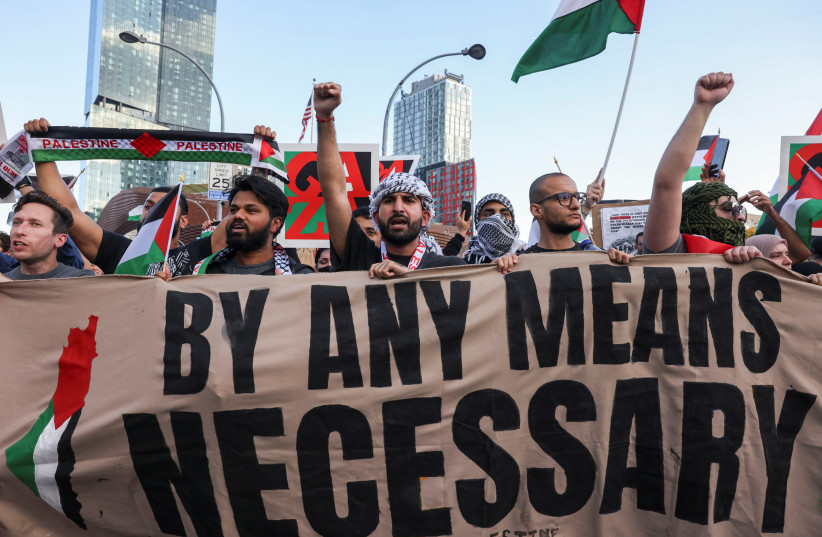Last week, Fred Keeley received a terrifying voicemail. “You went against a ceasefire? Well, now you’re gonna die, I swear you’re gonna die,” the caller said.
Keeley is the mayor of Santa Cruz, California. The call came after a 10-hour chaotic public hearing disrupted an anti-Israeli mob after the council failed to pass a resolution calling for a ceasefire between Israel and Hamas.
The caller was a 16-year-old boy who attended the meeting with his parents. When picked up by police, the family was on its way to a similar meeting in another city. He later called the mayor to apologize.
The rejection of the resolution set the anti-Israeli protesters into a tailspin and ignited a nasty and violent reaction, both inside and outside of city hall. Many in the audience rushed to the front of the room and hurled expletives and signs at elected officials. Outside, protesters smashed a window directly behind the city clerk as she sat in her chair.
In the wake of the October 7 attacks, anti-Israeli protests on college campuses and in city streets made front-page news on a daily basis. Now similar protests have quietly spilled into council chambers in cities small and large.

Despite majority support for Israel, radical activists have denied the well-documented atrocities against Israel, and pushed back against attempts to include condemnation of Hamas, a US-designated terrorist organization.
It has become the troubling new normal, but it is creating a wedge in communities, putting a stranglehold on city business and alarming Jewish communities, who feel left out, vulnerable, and voiceless as protesters hijack their local councils.
January 27 is International Holocaust Remembrance Day.
It is a day we are meant to commemorate the six million Jewish lives lost by the Nazi attempt to wipe the Jewish people off the Earth. The global Jewish population has still not recovered.
It was a genocide with roots in dehumanization, antisemitic rhetoric, and scapegoating – one that spurred global promises that we would never again allow these conditions to take hold. This Holocaust day reminds us that this is the test; this is the moment we, as a global community, have promised we would meet unwaveringly for 79 years.
Unfortunately, we are currently witnessing a remarkable rise of antisemitism across the United States. Now, more than ever, we must reflect on the lessons of the victims, celebrate the survivors, and protect them from living in fear all over again. City Councils will be central in this fight, and Jewish Federations across America are mobilizing to ensure they have the support they need to win it.
City council resolutions calling for a ceasefire
In Chicago, 28 council members have asked for a postponement on a Gaza resolution vote – the same day that the council would also be voting on a resolution to mark 79 years since the liberation of Auschwitz. The meeting was scheduled to be held three days before International Holocaust Remembrance Day.
“In deference to this commemoration and out of sensitivity to the Holocaust survivors who suffered so horribly, we do not believe the January meeting is the proper time to discuss this,” the aldermen wrote to alderwoman Rossana Rodriguez-Sanchez, who is the sponsor of the ceasefire resolution.
Rodriguez-Sanchez has yet to withdraw her resolution. Regardless, the meeting will likely be raucous – just like every other meeting where Chicago’s agenda now includes debate about the war. This has dragged on for three months.
Elected officials must stand firm. A local ceasefire resolution will not wipe away the terror felt by many Jews on Oct 7. Ceasefire resolutions have no impact on the foreign policy issue, other than creating even more division in the community.
They also do not reflect the views of most Americans. While most would like to see an end to hostilities, a Jewish Federations poll found that only 20% of Americans supported the idea of a ceasefire without dismantling Hamas and returning the hostages.
Yet protesters in their dozens – sometimes in their hundreds – head to council meetings because that’s where anti-Israeli organizers tell them to go. If their resolution isn’t passed, they inflict chaos. They bully and yell. They push and push until council members relent, or the meeting is stopped. Then the cycle starts again at a follow-up meeting.
Many councils have been forced to reduce their public comment sessions to just one minute per person, meaning someone who wants to speak about city business can’t voice their concerns over things city councils have actual control over.
On January 18, there were 217 people registered to speak at the Raleigh, North Carolina, council meeting – nearly all calling for a ceasefire. Protesters have told council members that they are complicit for the deaths in Gaza.
“I’ve heard from members of our Jewish community who do not feel safe,” Raleigh Mayor Mary-Ann Baldwin said. “They feel left out; they feel like their voices aren’t heard. That this is tearing apart our community.”
Back in Santa Cruz, Mayor Keeley can understand Baldwin’s feelings. He isn’t seeking to press charges against the teen who threatened his life. Instead, he asks for a written apology. This International Holocaust Remembrance Day, city councils across the nation should take an example from Keeley’s leadership, which reminds us that we can overcome hate if we pause to remember our shared humanity.
The writer is vice president for community relations at Jewish Federations of North America. Previously, he served as CEO and national director of Community Security Service (CSS), where he is also a security volunteer, leading some of its most important expansions and working closely with partners across the Federation system and Jewish community.
